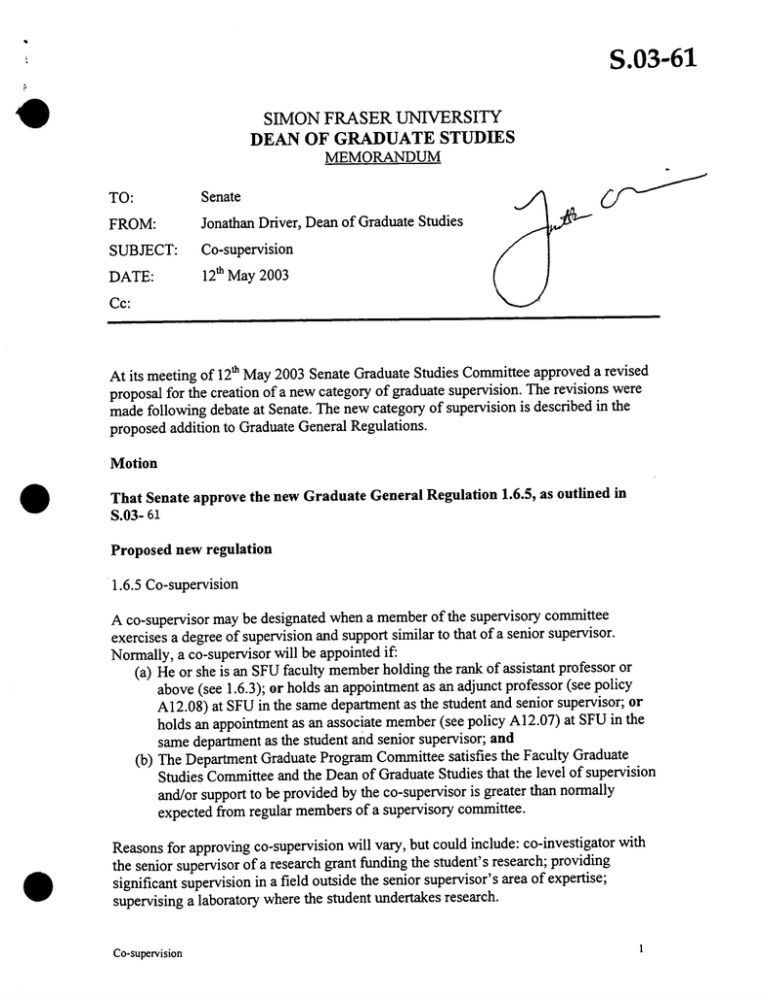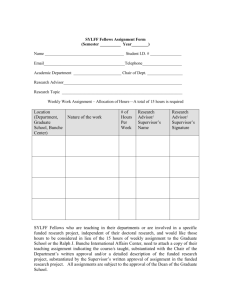Document 10441938
advertisement

S.03-61 SIMON FRASER UNIVERSITY DEAN OF GRADUATE STUDIES MEMORANDUM TO: Senate FROM: Jonathan Driver, Dean of Graduate Studies SUBJECT: Co-supervision DATE: 12' May 2003 Cc: At its meeting of 12 th May 2003 Senate Graduate Studies Committee approved a revised proposal for the creation of a new category of graduate supervision. The revisions were made following debate at Senate. The new category of supervision is described in the proposed addition to Graduate General Regulations. Motion That Senate approve the new Graduate General Regulation 1.6.5, as outlined in S.03-61 Proposed new regulation 1.6.5 Co-supervision A co-supervisor may be designated when a member of the supervisory committee exercises a degree of supervision and support similar to that of a senior supervisor. Normally, a co-supervisor will be appointed if: (a) He or she is an SFU faculty member holding the rank of assistant professor or above (see 1.6.3); or holds an appointment as an adjunct professor (see policy Al2.08) at SFU in the same department as the student and senior supervisor; or holds an appointment as an associate member (see policy A 12.07) at SFU in the same department as the student and senior supervisor; and (b) The Department Graduate Program Committee satisfies the Faculty Graduate Studies Committee and the Dean of Graduate Studies that the level of supervision and/or support to be provided by the co-supervisor is greater than normally expected from regular members of a supervisory committee. Reasons for approving co-supervision will vary, but could include: co-investigator with the senior supervisor of a research grant funding the student's research; providing significant supervision in a field outside the senior supervisor's area of expertise; supervising a laboratory where the student undertakes research. Co-supervision Appointment as co-supervisor recognizes significant contribution of time, expertise or financial resources. However, the supervision of the student remains the responsibility of the senior supervisor, who must perform all of the activities normally expected of a senior supervisor. The co-supervisor will not take on any of the administrative responsibilities of the senior supervisor. The co-supervisor may not substitute for the senior supervisor, except under circumstances described in 1.6.3. Co-supervisory status is recommended by the Department Graduate Program Committee to the Faculty Graduate Studies Committee. Departments and Faculties are responsible for setting criteria and standards appropriate to their disciplines. If the Faculty Graduate Studies Committee supports the appointment, it shall be forwarded to the Dean of Graduate Studies for approval. Status as co-supervisor will be noted on all relevant documents, and on the signature page of the thesis. Co-supervisory status may be terminated by the Dean of Graduate Studies if either condition (a) or (b) (above) is no longer met, or if the co-supervisor is unable to comply with SFU policies and procedures relevant to graduate supervision. It is the responsibility of the co-supervisor to inform his/her department chair (at SFU) or employer (off campus) of his/her status as co-supervisor. [Note: if the new regulation is adopted, it will be necessary to re-number the current section 1.65 to 1.6.6, and current 1.66 to 1.67] Rationale Senate Graduate Studies Committee has debated the institution of co-supervision as a way of recognizing the increasingly interdisciplinary nature of some graduate research, and the significant involvement in some graduate programs of individuals from outside departments and outside the University. SGSC agrees that such a designation makes sense in certain circumstances. For example, the increased collaboration of SFU faculty members with researchers in other institutions (e.g. Genome Canada, BC Cancer Agency, major hospitals, government research agencies, other universities) requires us to recognize the role of those researchers in graduate supervision; furthermore, acknowledgment of their role in graduate supervision may assist them in obtaining further research funding that will be used to support SFU graduate students. SGSC believes that co-supervision should be allowed in cases in which an individual has been recognized by a department as an adjunct professor (from outside SFU) or an associate member (from within SFU). This ensures that the department has a chance to evaluate the academic credentials of an individual who is not an SFU faculty member, and assures the Dean of Graduate Studies that appropriate "quality control" has been exercised. The Faculty Graduate Studies Committee must also approve the appointment. All faculty members are expected to serve as regular members of supervisory committees as part of their normal responsibilities towards a graduate program. Appointment of a co- Co-supervision 0 . supervisor from within the department is acceptable, provided that he or she makes a significant contribution to the supervision of the student. SGSC wishes to maintain the requirement that a senior supervisor be an SFU faculty member, normally in the same department to which the student was admitted. The senior supervisor should retain full responsibility for overall supervision. SGSC also wishes to avoid potential problems for a student that might result from conflicting advice. For reasons of administrative transparency, the co-supervisor will not take on any of the administrative responsibilities of the senior supervisor. . . Co-supervision




